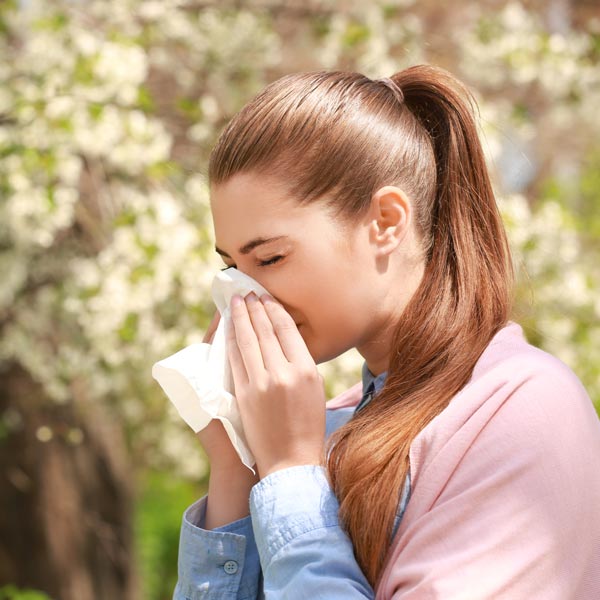Managing Your Seasonal Spring Allergies

That old saying, “April showers bring May flowers” is true and causes some people to have bittersweet feelings about the Spring. We all love the warm weather, longer days, rainy afternoons and blooming flowers, but with all those blooming flowers and sunshine comes pollen and allergies. This time of year we see pollen everywhere and this season is daunting to those who suffer from allergies. Allergy sufferers want to be able to enjoy the beauty of spring, however, when the pollen starts, so do the allergy symptoms and being outside isn’t enjoyable anymore. For some, it becomes unbearable to be outside. The good news is, that even though you’ve been diagnosed with seasonal allergies, you may not have to remain on antihistamine and medicine forever. There are ways to manage and prevent your seasonal allergies no matter how intense they can get.
Before we dive into how to do that, we must first ask ourselves…What are allergies? There are a multitude of different symptoms including; skin rash, fatigue, runny nose, headache, itchy throat, sneezing, stuffy nose, and congestion that can occur all at once, but what exactly causes the body to have these symptoms? Allergies occur when your immune system reacts to a foreign object that has entered your body. Even if the object is not harmful to us, our immune system still recognizes it as foreign and therefore signals an alarm in our body to help fight against it. Most of the time this immune system response is positive, for example when we are fighting a cold; however there are times when this response can be negative, like in the case of seasonal allergies. Pollen is not necessarily harmful to our body, but our immune system does not recognize it and therefore begins attacking against it, ultimately giving allergy sufferers all, or some of the above symptoms.
Everyone has different types of allergies and different symptoms to those allergies. There are food allergies, animal allergies, allergies to chemicals and fabrics, allergies to medications, or allergies to pollen and nature. Whatever it is that your allergies may be, all that means, is that your body does not like that particular thing and recognizes it as ‘harmful’ to your body, even if it isn’t. Now while you can experience allergies you should know that there are different levels to allergies. Some people have a minor allergies while others have deadly ones. Despite the severity they are all caused by one thing…histamines. Histamines are the culprits behind your allergies. They are the reason for your symptoms. When you breathe in pollen, histamines are the ones that make you sneeze, have itchy eyes, and intense congestion.
Histamines determine whether or not your body is going to experience mild reactions or enter a state of anaphylaxis, a life threatening reaction to an allergen. Even though histamines sound all bad, they are not. They aid in fighting other infections and overall just help us stay healthy. However, they do overreact when it comes to pollen and other allergens. This is why doctors prescribe you with antihistamines when you are experiencing allergies. Antihistamines block histamines from taking action and giving you those unwanted symptoms. However as we said before, there are natural ways to manage your allergies without over the counter or prescription medications. Try these remedies first next time you have have an allergy attack.
Here are a few common tips to help manage your seasonal spring allergies:
- Stay indoors during the mornings when pollen is high
- Stay inside on dry windy days
- Invest in an air purifier
- Change your AC filters often
- Close your windows when the pollen levels are high, usually in the morning
- Clean and dust your furniture
- Vacuum frequently during the week, preferably with one that has HEPA filter
- Avoid smoke and pet dander
- Shower and change your clothes when you get home
- Don’t hang laundry outside
- Keep your indoor air clean by using an air conditioner in both your home and car
When people experience allergy symptoms, the first thing they commonly do is reach for the medicine cabinet for an over the counter medicine. However, this isn’t the only option. Here are other ways to help manage your allergies:
- Chiropractic
- Acupunture
- Honey
- Vitamin C and probiotics
- Peppermint essential oil
- Dehumidifiers / air conditioners
With all of this information in mind, just know that you do not have to fall inferior to your allergies. Just because the spring time is here, that does not mean you have to spend the entire season indoors. Instead, take the necessary precautions to help manage your seasonal allergies and try some natural ways to help treat the symptoms you come across. By doing this, you will be able to be outside and enjoy the warm weather, sunshine, and blooming flowers!
